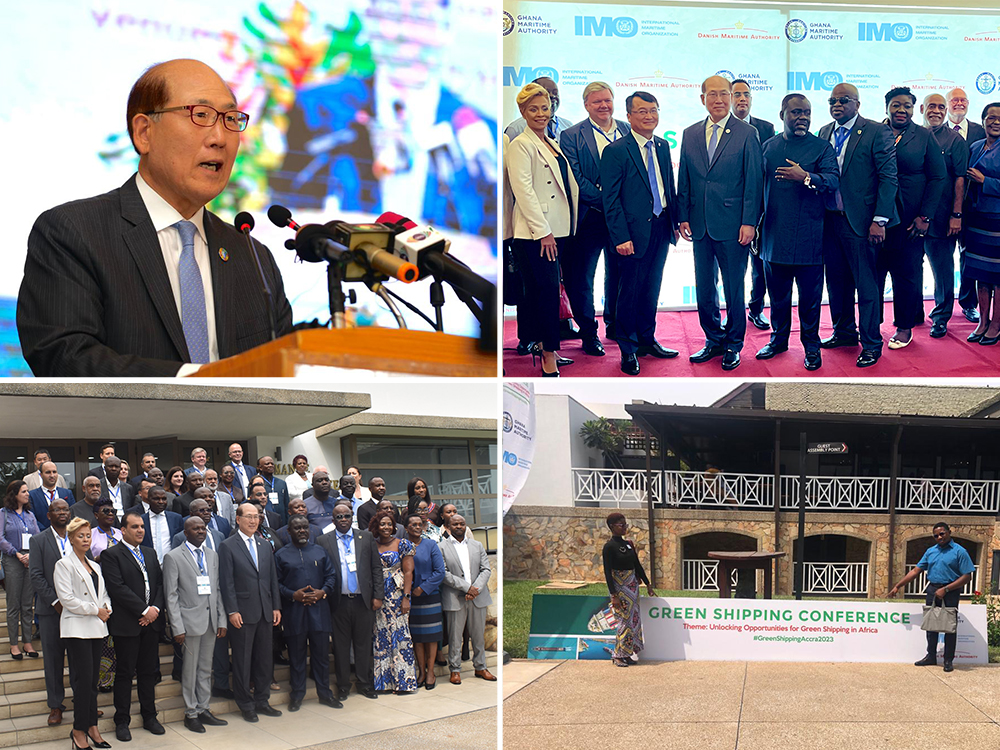
Unlocking opportunities for Green Shipping in Africa : IMO
LONDON : A Green Shipping conference in Accra, Ghana (15-16 February), provided a forum to discuss opportunities and challenges for African countries in the decarbonization of international shipping. Key drivers of change include an ambitious and global regulatory framework put in place by IMO addressing energy efficiency; development of new technologies; and investments in renewable energy and infrastructure.
The conference – the first of its kind on the continent – was co-organized and co-sponsored* by IMO, in collaboration with the Maritime Authorities of Ghana and Denmark. Participants came from 15 African countries.
Opening the Conference, IMO Secretary-General Kitack Lim stressed the importance of collaboration and cooperation: “Across the continent, there is a strong willingness and commitment to work with all stakeholders to explore and make a push towards renewable energy, to ensure that maritime transport benefits from the relevant investment and technology transfer, and that the workforce of the future is equipped for this imperative transition. Knowledge sharing is critical.”
Mr. Roel Hoenders, Head of Air Pollution and Energy Efficiency of IMO, presented IMO’s latest energy efficiency regulations (EEXI and CII) and state-of-play in the revision of the Initial IMO GHG Strategy and the development of a basket of mid-term GHG reduction measures and associated impact assessment.
Through a programme of high-level in-person panels and interactive sessions, key decision-makers and senior advisers from African countries, leading business representatives from the maritime value-chain, ship-owners and operators to cargo owners, ports, energy producers and financial institutions, development banks, academia and civil society identified expectations with regard to the revision of the Initial IMO GHG Strategy and the development of economic measures. New ways of working together, especially between the public-private sector and between developed and developing countries, are crucial for the green transition.
The panel sessions addressed opportunities and challenges in terms of unlocking finance for port infrastructure, renewable energy production, training and skill development of seafarers as well as job generation and attracting young generations to a low-carbon African shipping industry.
Country representatives highlighted the need to properly assess possible impacts on States of IMO’s next greenhouse gas reduction measures. There was a focus on ensuring an equitable transition, including by means of additional capacity building and technology cooperation provided through IMO.
Also emphasized was the need for further regional and cross-continental cooperation in promoting energy efficient shipping, including through the use of future carbon revenues for port bunkering infrastructure, scholarships in renewable energy economics, and possible retrofitting and upgrading of the African shipping fleet.
The conference provided insightful elements which can inform discussions during the upcoming meetings of the Intersessional Working Group on Greenhouse Gases (ISWG-GHG) and MEPC 80 which will see the adoption of the revised IMO GHG Strategy and the further development of the basket of mid-term GHG reduction measures, including the associated analysis of possible impacts on States of economic measures.
IMO supports developing countries in renewable energy production, through the ITCP, projects and the IMO GHG TC Trust Fund, and organized earlier events on opportunities in ensuring a “just and equitable” transition of international shipping as presented during IMO’s 2nd Alternative Fuel Symposium which took place on 21 October 2022, see: IMO Symposium on alternative low- and zero-carbon fuels for shipping as well as during COP 27 in Sharm-el-Sheikh.
